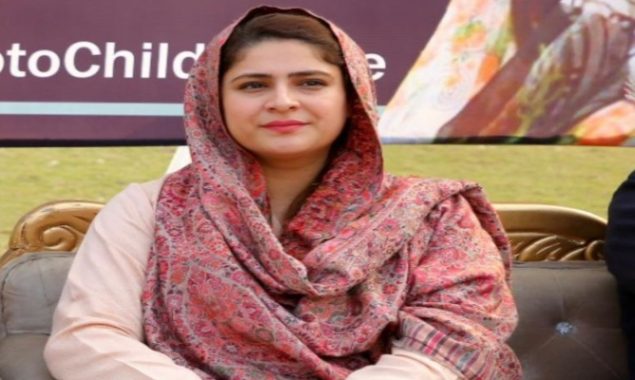Synopsis
CPWB chairperson shares her journey of overseeing the upbringing of Punjab’s neglected minors

Punjab Child Protection Welfare Bureau (CPWB) Chairperson Sara Ahmed. Image: File/BOL News
LAHORE: Sarah Ahmad is a name which comes to mind when one talks about children’s rights and their protection in Punjab.
During her tenure as chairperson of the Punjab Child Protection Welfare Bureau (CPWB) she got rid of ‘ghost workers’ which were previously on the payroll of the department. This week Bol News talked exclusively to her about the different measures the CPWB is taking for children protection across the province.
When was the child protection bureau established and what are the ultimate aims of the department?
The Child Protection and Welfare Bureau (CPWB), Punjab was established in 2005 under Section 5 of the Punjab Destitute and Neglected Children Act 2004 by former chief minister Chaudhary Pervaiz Elahi.

The bureau was mandated to rescue children victims of child abuse and neglect and to provide them shelter in state of the art facilities governed by … professionals. It is indeed an honour for me to be serving as chairperson of this department which has a great cause associated with it. My mission is to make Punjab safe for children, where child rights are protected. We are providing protection, quality education, health, recreation and rehabilitation to the most vulnerable segment of our society.
My ultimate aim is to see my bureau’s children become confident individuals so that they can get themselves accommodated into the social fabric of society and live their lives as honourable citizens. I am making an all-out effort to curb violence against children … as these children are our future.
The treatment that a nation has with its children determines its character. We are leaving no stone unturned and carrying out our work with the best of our abilities for the destitute and neglected children as per the PDNA act.
Even our critics admit that a lot of improvement has been witnessed in this department since I took charge. CPWB provides response to abuse, violence and exploitation against children and provides them protection, care and rehabilitation.
We have adopted an effective mechanism to ensure efficient and effective service delivery to destitute and neglected children for their rescue, protection, health, education, counselling, reunification, temporary custody and rehabilitation. These efforts have turned this bureau into a symbol of child welfare in accordance with the Constitution and international commitments and conventions.

What was the progress of your department in 2021?
Let me share that 2021 has been a very successful year for CPWB as we took a very big and visionary initiative that was the expansion of CPWB in all the 36 districts of Punjab. It will be extended to all 36 districts by the end of 2022.
The work has started in the majority of districts out of which we recently did the groundbreaking of Okara, Kasur and Rawalpindi and we will do the groundbreaking of others very soon. Other than this three big children protection institutions were completed in Faisalabad, Sahiwal and DG Khan.
We are all set to start another one in Sargodha very soon. In 2021, under public-private partnership with donation from philanthropists, computer labs for children were established in eight district institutions of the CPWB in Punjab where the children are getting latest and state of the art education.
For the first time, we started empowering children with technical skills’ training including nursing classes, stitching classes [and] special sports classes. Cooking classes were started for girls in all districts of Punjab where our centres are present.
In 2021, the CPWB took more than 7,600 children into custody from across Punjab. All of these children were in some sort of trouble; there were destitute and neglected minors and we rehabilitated them, provided food, shelter and education out of which many of these children are still with the bureau.
We also reunited about 500 children with their families who were lost and we found them from different places. We kept them with us and after locating their families we contacted their parents and the minors were handed over to the families. We also found around 70 newborn children whom their parents have left on roads and other parts of the city.
So through child protection courts, we got these newborns adopted by the suitable deserving families. Other than this, there were 200 cases of child abuse and torture in which CPWB intervened. We first take them into protective custody, provide them food, shelter and education.
Please share the details about the child helpline. What is it all about?
Child Helpline 1121 is established at CPWB for the immediate help and assistance to the destitute and neglected children. This helpline provides prompt assistance and support to the children subjected to violence, exploitation, abuse and neglect. This helpline is also used for the dissemination of information and guidance with respect to child rights. This helpline is centralised and active all across Punjab 24 hours a day and seven days a week.
With this helpline, in 2019 and 2020, we rescued 12,432 children, 374 domestic violence victims and 86 infants. Out of these, 79 infants were given in foster care.
Moreover, 190 awareness campaigns were launched using this helpline and we received 5,252 calls on [it]. Apart from this, we also provided psychological counselling to 10,211 children in Punjab during 2019 and 2020.

What other initiatives have you taken in 2019-2020?
To be honest, it is a long list. Let me share the few major ones with you. We started mass awareness campaigns against child abuse and beggary, initiated rescue operations against child beggars, busted child beggary gangs, ensured foster care (adoption of infants), framed an exit policy for boys and girls above 18 years of age and traced families of children who were lost.
In addition to this, we also trained and sensitised the police on how to handle the child abuse cases with the help of NGOs, initiated an awareness campaign against domestic child labour, arranged seminars on children’s rights and appointed focal persons in all 36 districts of Punjab.
Read More News On
Catch all the Pakistan News, Breaking News Event and Latest News Updates on The BOL News
Download The BOL News App to get the Daily News Update & Follow us on Google News.




